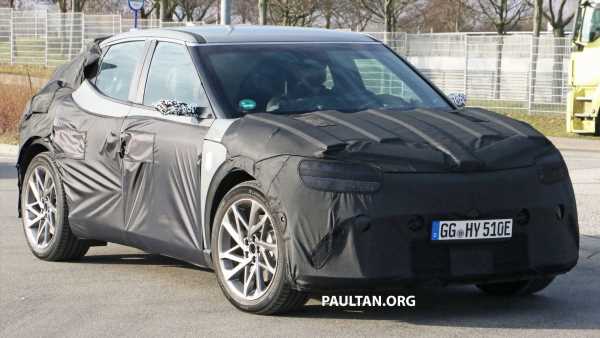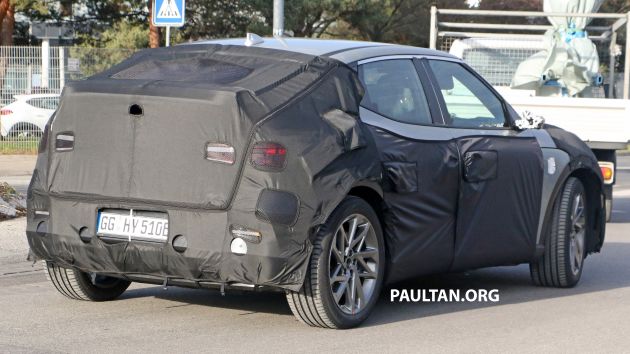Unless you’ve been living under a rock these past few years, you’d know that the world is going electric – and at a pretty fast rate at that. Case in point – the Hyundai Motor Group is going all-in on battery-powered zero-emission vehicles, with a swathe of new Hyundai and Kia models coming sooner rather than later.
The company’s premium brand Genesis will be caught up in this arms race as well, as it too will be building a range of electric vehicles. The company is developing its version of the Hyundai Ioniq 5 and Kia CV crossovers, and the car you see here is the development prototype of that model, codenamed the JW.
While Genesis previewed its electrification strategy with its striking (and tiny) Mint Concept, the company’s actual spearhead in its EV push will take on a more conventional SUV look. Still, with its sloping rear windscreen, the JW will cut a distinctive figure on the road – although the seemingly tall rear deck is likely a mere illusion created by the hard disguise.
The car will also feature Genesis’ trademark quad-lamp graphic at the front and rear, although the brand’s dramatic shield grille will likely become smaller and closed off for better aerodynamics. Other notable design cues include the wraparound windscreen design (replete with an upper chrome strip that leads into the side windows), clamshell bonnet and door mirror-replacing side-view cameras.
Despite the compressed proportions, this is not a small car – one only needs to gawp at the intricate 20-inch alloy wheels to realise that. The comparatively larger dimensions should at least ensure generous interior space, especially as the JW will ride on Hyundai’s specially-developed Electric-Global Modular Platform (E-GMP) that will also be used by its stablemates.
The new architecture uses a skateboard-like design, featuring modular battery packs that can be adapted to different range requirements and wheelbase lengths. It’s designed to be rear-wheel drive by default, with a provision for all-wheel drive with the addition of a front motor. A new motor design, a direct oil-cooling system, silicon carbide semiconductors and a new multi-charging system improve energy and space efficiency.
In maximum configuration, cars built on E-GMP will be capable of sprinting from zero to 100 km/h in 3.5 seconds, hit 260 km/h and have a range of over 500 km on the WLTP cycle – not all at once, of course. It remains to be seen if the JW will achieve any of these numbers, but given that it will be wearing the flagship Genesis badge, it will at least have some possibility.
Headline figures for the Ioniq 5 have already been leaked, giving us an inkling of what to expect – reportedly, that car will feature as much as 310 hp and a range of up to 510 km. Expect the Genesis JW to go on sale in the second half of the year, a few months after the Hyundai gets revealed in the coming weeks.
Source: Read Full Article


